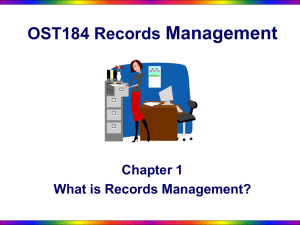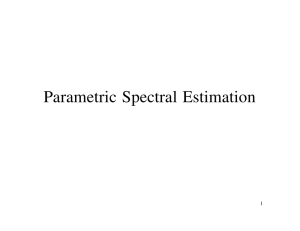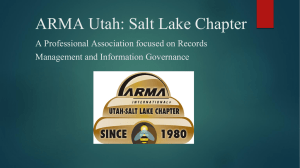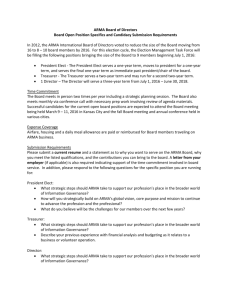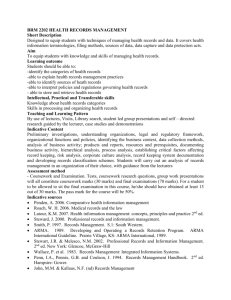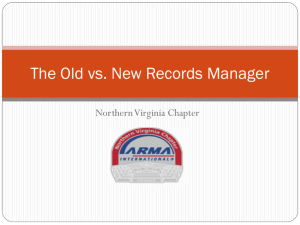September 12, 2016 To: Subject
advertisement
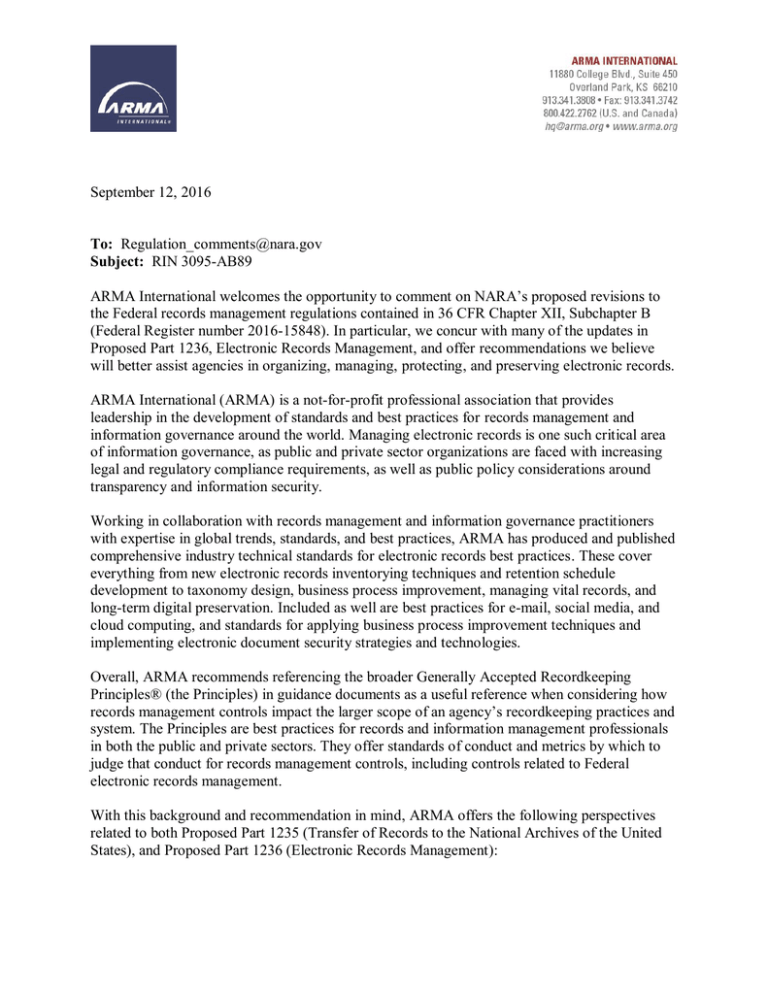
September 12, 2016 To: Regulation_comments@nara.gov Subject: RIN 3095-AB89 ARMA International welcomes the opportunity to comment on NARA’s proposed revisions to the Federal records management regulations contained in 36 CFR Chapter XII, Subchapter B (Federal Register number 2016-15848). In particular, we concur with many of the updates in Proposed Part 1236, Electronic Records Management, and offer recommendations we believe will better assist agencies in organizing, managing, protecting, and preserving electronic records. ARMA International (ARMA) is a not-for-profit professional association that provides leadership in the development of standards and best practices for records management and information governance around the world. Managing electronic records is one such critical area of information governance, as public and private sector organizations are faced with increasing legal and regulatory compliance requirements, as well as public policy considerations around transparency and information security. Working in collaboration with records management and information governance practitioners with expertise in global trends, standards, and best practices, ARMA has produced and published comprehensive industry technical standards for electronic records best practices. These cover everything from new electronic records inventorying techniques and retention schedule development to taxonomy design, business process improvement, managing vital records, and long-term digital preservation. Included as well are best practices for e-mail, social media, and cloud computing, and standards for applying business process improvement techniques and implementing electronic document security strategies and technologies. Overall, ARMA recommends referencing the broader Generally Accepted Recordkeeping Principles® (the Principles) in guidance documents as a useful reference when considering how records management controls impact the larger scope of an agency’s recordkeeping practices and system. The Principles are best practices for records and information management professionals in both the public and private sectors. They offer standards of conduct and metrics by which to judge that conduct for records management controls, including controls related to Federal electronic records management. With this background and recommendation in mind, ARMA offers the following perspectives related to both Proposed Part 1235 (Transfer of Records to the National Archives of the United States), and Proposed Part 1236 (Electronic Records Management): A. Part 1235 (Transfer of Records to the National Archives of the United States) 1235.32 (access restrictions on transferred records) ARMA urges NARA to reconsider the blanket authority provided in subsection (a) to remove restrictions on the access and use of information, or to not apply authorized FOIA exemptions if NARA believes it to be in the public interest. There is value in maintaining the requirement for NARA to consult with the originating agency that applied the restriction and maintained the restriction at time of transfer. As written, “public interest” could be arbitrarily applied, which may cause agencies to delay transferring inactive information of permanent record value to NARA until no restrictions remain in force. ARMA is concerned that this may put those older records at risk for damage or degradation from inconsistent storage conditions. Therefore, ARMA recommends deleting the words “relax or remove” in the last sentence of subparagraph (a) but leaving the authority to “impose” legitimate restrictions which might have been omitted at time of transfer. In addition, we encourage the insertion of additional language that imposes some obligation on NARA, when it believes a release of restricted information to be in the public interest, to negotiate lifting the restrictions with the originating agency, or allow the agency to process any FOIA actions that would cite any restrictions, or return the material to the agency for processing and maintenance until the records could be accessed within NARA without restriction. 1235.50 (transfer specifications and standards applicable to electronic records) When listing the formats for transfers of electronic records, ARMA urges NARA to actually cite authoritative standards in paragraph (a) as is done in other parts of this regulation, rather than link to a guidance document on NARA’s website. Agencies will add requirements during IT system procurements for the ultimate accession transfer of data of permanent value at the end of the life cycle. ARMA is concerned that the citing of a relatively transitory guidance document in a Federal regulation as the standard for acceptable transfers could eliminate previously acceptable formats without any vetting of acceptable formats to agencies. Agencies could plan to use a format listed on the site in 2016 in designing an IT system and then later find the format removed from a webpage guidance document without any further notification or vetting through the Federal Record process. Therefore, ARMA urges NARA to remove the last sentence of 1235.50(a) citing a guideline document. B. Proposed Part 1236 (Electronic Records Management) Section 1236.2 (what definitions apply to Part 1236, Electronic Records Management) ARMA recommends using the following definitions which are taken from our technical report Glossary of Records and Information Management Terms (ARMA TR 22-2012): o ARMA defines an electronic message as “A message (i.e., structured content meant for communication) sent between networked computing stations.” Our definition notes that “Electronic messages are potentially complex in that, in addition to content and structure, they may comprise several sets of metadata (e.g., identity, transmission, security, content type, content transfer encoding, or format metadata), embedded links, attachments, etc.” o ARMA defines unstructured information as “Any information that has no identifiable structure of any kind (e.g., unstructured text, audio, or video files).” o In both instances, ARMA’s definitions are more descriptive as they were developed for the broader community. We believe their use by the Federal government will facilitate transparency and convergence. Section 1236.21 (additional requirements for managing electronic messaging records) ARMA is concerned that the term “employees” is insufficient to compel compliance by those other than Federal employees, such as those who have been provided government e-mail accounts and who often have government-furnished devices for the conduct of official business. These include contractors, consultants, unpaid advisors or board members, nonfederal law enforcement or crisis-response task force members, detailees from state and local governments, and foreign liaison officers. The e-mail communications of those conducting government business on government systems should not be excluded just because they are not Federal employees. Therefore, ARMA recommends adding a sub-paragraph specifying the applicability of this regulation to all people using government e-mail systems or other government communications devices to perform or support government functions regardless of their employment status. ARMA recommends using more straight-forward language to promote clarity of expectations. For example, ARMA recommends replacing 1236(a) with: “Employees should only use official electronic messaging accounts unless an agencyadministrated system is not available. In those instances, use of a non-official electronic messaging account should be as limited in duration and scope as possible. Use of nonofficial accounts should never be a routine business practice.” In addition, ARMA recommends specifying that in those instances in which a non-official account must be used, it must be a unique account used only for agency business and not intermingled with personal e-mail accounts. This would segregate the messages and make the use of a non-official account more understandable. With respect to 1236(d), ARMA recommends removing the word “intentionally” so that it reads: “If employees fail to follow these requirements, they may face adverse disciplinary actions in accordance with 5 U.S.C. Ch. 75 (also see 44 U.S.C. 2911).” Because an adverse disciplinary action is not certain, ARMA is concerned that including the word “intentionally” could reduce accountability for following the requirements. Section 1236.22 (additional requirements for managing email records) In subsections (b)(2) and (5), ARMA is concerned that the treatment of associate nicknames or aliases is insufficient. As written, it omits organizational e-mail accounts used to conduct agency business and which are shared by multiple employees. ARMA supports the intent of these requirements, which is to require the inclusion of senior officials who have an organizational e-mail address that is not published in a directory as a practical matter and is known only to a smaller number of direct reports, a command center, a security detail, etc. However, we urge NARA to include in the regulation other official e-mail accounts shared by multiple people who share a specific function. Of particular importance is the need to preserve potentially permanent records and other information of potential long-term value, such as e-mails shared by watch officer billets in 24-hour command centers, crisis action teams, those processing requests for information (i.e. OSD.FOIALiaison@mail.mil), or those providing guidance (i.e. etransfers@NARA.gov). Therefore, ARMA recommends adding language to include “functional office or any accounts shared by multiple people.” Thank you for your consideration of our comments. ARMA is pleased to answer any questions or provide additional information about our recommendations, or about records management policies and practices in general. Sincerely, Tera Ladner, JD, IGP, CRM President, ARMA International
